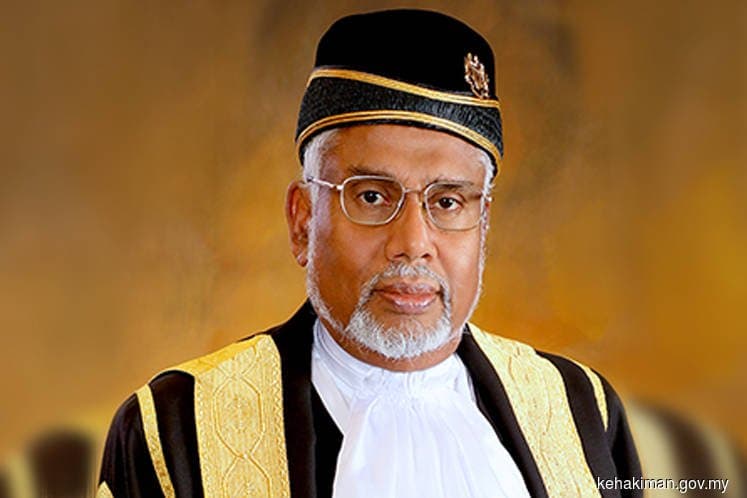
PUTRAJAYA (June 21): A Court of Appeal judge has reminded his brother and sister judges that the judiciary is expected to police the executive and legislature where all three are separate pillars in the basic structure of the government.
Justice Datuk Hamid Sultan Abu Backer said the judiciary has to ensure the federal constitution is not amended or destroyed against the interest of the public, and the fundamental liberties provisions are not made illusionary by way of legislation, which can be harsh and oppressive and are inimical to the Universal Declaration of Human Rights as legislated under the Suhakam Act 1999.
These provisions, he said, are also entrenched in Articles 5, 8, and several other parts of the constitution. Article 5 concerns right to life and liberty while Article 8 is about equality.
Justice Hamid said this in his 101-page judgment in two appeals concerning the drug trafficking case of Nigerian nationalities Aluma Mark Chinoso and Anyim Daniel Ikechukwu.
The prosecution had appealed against Chinoso's acquittal by the High Court, while Anyim was appealing his conviction. Both appeals were dismissed by a Court of Appeal panel chaired by Justice Hamid.
In the judgment dated June 17, Justice Hamid cited three cases that recognise that Malaysia upholds the constitutional supremacy doctrine.
“Under the doctrine, the courts are the final arbiter of issues related to the constitution of fundamental liberties, as affirmed positively in the Semenyih Jaya, Indira Gandhi and Alma Nudo cases.
“The doctrine of constitutional supremacy takes the position that Parliament must be guided by the constitution. The judiciary must make sure that Parliament legislates according to the constitutional framework and all its agencies administer the legislation according to the rule of law related to constitutional supremacy,” he added.
He pointed out that the judiciary takes an oath to preserve, protect and defend the constitution and hence they are expected to demonstrate “judicial dynamism” to protect the constitution as well as social justice.
Parliament and executive must be accountable
Justice Hamid added that Parliament as well as the executive must uphold the concept of accountability, transparency and good governance as failure to do so will breach the constitutional framework.
“Judges by oath of office are entrusted to ensure that the constitutional framework is not breached.
“Rule of law requires the judiciary to be subservient to the constitution and condone policy of the government, provided it does not breach the constitutional framework or the doctrine of accountability, transparency and good governance,” he said.
The appellate court judge also said from the Semenyih Jaya, Indira Gandhi and Alma Nudo cases, it was clear that the 1988 constitutional amendment had the effect of undermining judicial power and hence impinges on the following features to the constitution namely the doctrine of separation of powers and the independence of the judiciary.
“With the removal of judicial power from the inherent jurisdiction of the judiciary, that institution was effectively suborned to parliament, with the implication that parliament became sovereign. This result was manifestly inconsistent with the supremacy of the Federal Constitution enshrined in Article 4(1).
“It is worthwhile reiterating that Parliament does not have power to amend the constitution to the effect of undermining the features of the doctrine of separation of powers and the judiciary,” he added.
Media should not be shackled with contempt
Justice Hamid also said that the media as well as the Malaysian Bar and other non-governmental organisations are "invisible pillars of the constitution to protect its decay and abuse as well as fundamental rights".
“In essence, democracy will collapse if freedom of speech and expression under the constitution is grossly violated by the three pillars and the judiciary fails to stop executive and legislative intrusion in the judicial powers of the court as well as fundamental rights,” he added.
Silencing media or critics have long been made redundant in England.
Quoting from a report from the Geneva-based International Commission of Jurists in its “Report on Malaysia" in 2002, Justice Hamid said every judge should read it to ensure their conduct does not put the administration of justice in disrepute.
“In essence, the judicial power must not be abused by invoking contempt powers against critics and media; as independent press is bulwark of accountability, transparency and good governance of the rule of law for democracy to survive. English judges take no attempt to victimise persons who are said to have scandalised or purportedly scandalised the court.
“As Lady Hale said: ‘We have a free press and if the press wants to attack us (the judiciary), that’s fine. But we have to continue to do the job according to our judicial oaths … we certainly do not pay any attention to attacks of that nature’,” the judge said, referring to Baroness Brenda Hale, a former UK Supreme Court president who ruled in the Brexit case.
Quoting Lord Bingham, Justice Hamid said the law of contempt must satisfy certain requirements, namely that it should be clear, sufficiently stable; generally prospective; of general application; administered by an independent judiciary; and the principles of natural justice and the right to a fair trial are observed.
Hence, he said it is important for judges themselves to take note of this aspect of judicial power and must not bring further shame to the judicial institution by arbitrary exercising its judicial power, in breach of rule of law.
“No amount of justification in a judgment justifying caging media persons or advocates for contempt or attempted contempt for scandalising court in this time and era will enhance the image of judiciary in exercising its judicial power.
“Such judgments will be perceived to be one of the lowest ebbs in the evolutionary jurisprudence related to constitutionalism,” warned Justice Hamid.